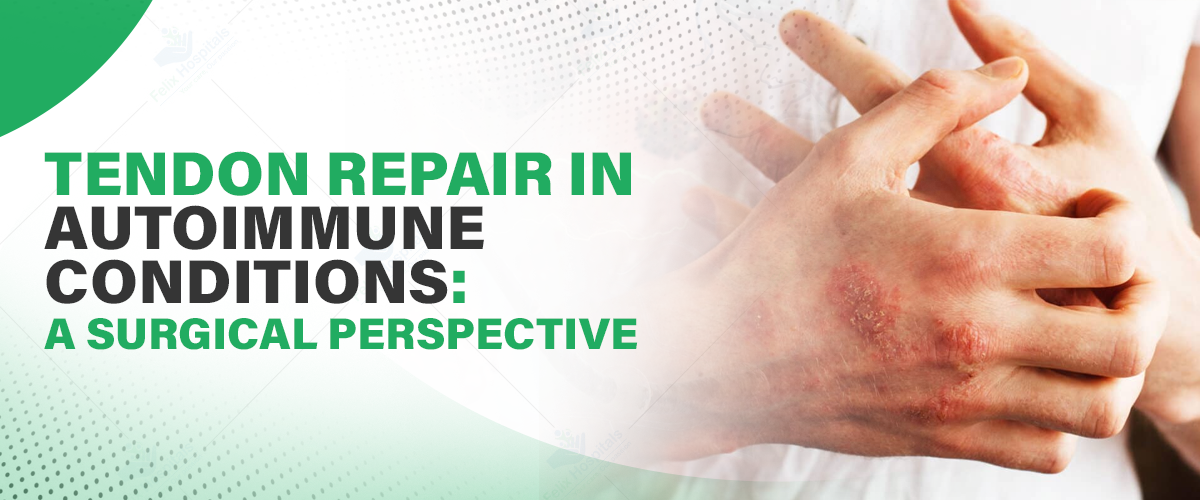
Subscribe to our

Autoimmune diseases, including Rheumatoid Arthritis (RA), Systemic Lupus Erythematosus (SLE), and Ankylosing Spondylitis, tend to affect the musculoskeletal system, especially the tendons. Tendons, being attachments of muscles to bones, are vital for movement and joint stabilization. Autoimmune diseases tend to result in chronic inflammation, causing tendon damage, degeneration, and rupture. Tendon repair surgery is therefore necessary in these instances in a bid to regain function, alleviate pain, and enhance the quality of life for the patients.
If you like a best rheumatology hospital within the locality that has experience with autoimmune diseases and their musculoskeletal manifestations, ensure that the center offers up-to-date surgical and non-surgical interventions. Tendon repair surgery in such a situation needs to be planned carefully and carried out in time to avoid permanent disablement.
This blog is an analysis of the surgical process of repairing tendons in autoimmune diseases considering the significance of early treatment, the sequence of surgeries, and issues encountered during treatment.
Get Started on Your Recovery Journey, Don't let autoimmune diseases hinder your movement. Call us Today at +91 9667064100.
Autoimmune diseases are when the immune system, which is supposed to defend the body against infection from viruses and bacteria, instead attacks healthy tissue. The faulty immune response creates inflammation that, over time, can severely damage tendons. Rheumatoid Arthritis, Lupus, and Ankylosing Spondylitis are especially known to attack tendons, causing:
Tendons are a vital part of the musculoskeletal system, which transmit the force generated by muscles to bones to facilitate movement. Tendon injury in autoimmune conditions can result in:
Other tendon injuries that affect autoimmune patients include rotator cuff tears, Achilles tendonitis, and trigger finger. These conditions are particularly challenging for autoimmune patients, as their immune system can contribute to chronic inflammation and tendon degradation. Proper diagnosis and timely intervention are crucial to prevent further complications such as reduced mobility, chronic pain, and long-term joint damage. Specialty care from experts at a best hospital nearby can help manage these conditions effectively, offering treatment options like physical therapy, corticosteroid injections, or even surgical interventions when necessary, to preserve functionality and enhance quality of life.
Conservative means like medication, physio, and dietary alterations are typically the first line. But in others, they could be insufficient. Surgery is indicated in the below-mentioned instances:
Delayed tendon repair can result in future complications, which can result in joint deformity and lifelong disability. Access to the best rheumatologist in Noida is a guarantee of immediate treatment that is customized to every patient, thus preventing further injury and restoring functioning as much as possible.
There are two main types of tendon repair surgeries, with its pros and cons:
Open Tendon Repair Surgery:
Minimally Invasive Tendon Repair Surgery:
Robot-assisted surgery, being one of the minimally invasive methods, provides unprecedented accuracy and improved outcomes.
Autoimmune patients present challenges to tendon repair, which are:
Prior to surgery for tendon repair, extensive evaluation is performed to determine the patient's overall health and preparedness for the surgery. Of specific significance are:
Convalescence after surgery for the repair of tendons is an important process which must be properly planned and executed. The most important elements of postoperative care are:
Surgical repair of the tendon is successful depending on the following:
Through proper management, patients can achieve enhanced tendon function, pain relief, and quality of life.
Felix Hospitals has a Rheumatology Department where the team deals with advanced autoimmune patient treatment. With a background in immunotherapy, joint injections, and sophisticated surgical interventions, the department ensures customized treatment programs for conditions such as Rheumatoid Arthritis, Lupus, and Ankylosing Spondylitis.
Our patient-oriented approach focuses on:
If you’re suffering from tendon damage due to an autoimmune condition, don’t wait. Book an appointment with Dr. Kiran Seth at Felix Hospitals by clicking here.
Surgery for tendon repair is an important function in the treatment of autoimmune disorders, restoring movement and enhancing quality of life. At Felix Hospitals, we utilize advanced surgical methods combined with customized care to achieve the best results for our patients while keeping the cost of rheumatology treatment in check to make our solutions affordable.
If conservative management has not alleviated, come to our expert team at Felix Hospitals for a complete assessment and customized treatment plan. Your well-being and health are our first priority.
1. What autoimmune diseases cause tendon damage?
Ans: Autoimmune diseases such as Rheumatoid Arthritis, Systemic Lupus Erythematosus (SLE), and Ankylosing Spondylitis are the reason for chronic inflammation, which causes tendon damage, degeneration, and rupture.
2. How would I know if I need tendon repair surgery?
Ans: If you have a severe tendon injury, loss of function, or persistent pain that cannot be alleviated with medication or physical therapy, you might need tendon repair surgery.
3. What are some of the various types of tendon repair surgeries?
Ans: Tendon repair surgeries usually come in the form of two types: open tendon repair (conventional surgery) and minimally invasive tendon repair, i.e., robotic-assisted surgeries for fast recovery and least scarring.
4. What are the autoimmune patients' problems with tendon repair?
Ans: Autoimmune patients can face changed healing, delayed recovery, increased risk of complications such as infection, scarring, and postoperative flare-up due to failure of the immune system.
5. How long is the recovery time from tendon repair surgery?
Ans: Recovery will depend on numerous factors but will typically include time off and physical therapy to restrengthen and mobilize the tendon. Almost all patients will see considerable improvement within a couple of months.
6. What are the advantages of minimally invasive tendon repair surgery?
Ans: It is possible through minimally invasive surgery to reduce scarring, recover faster, and have lesser chances of infection compared to open surgery, and that makes it a perfect procedure for most patients.
7. What are my best chances of successful recovery from tendon repair surgery?
Ans: Healthy living, overall good management of your autoimmune disorder, and physical therapy as prescribed by your physician can help you a great way to help you recover and heal in the long term.